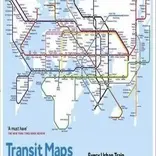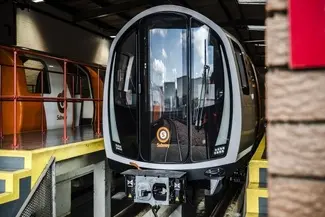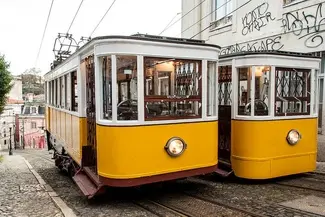A fresh approach to franchising

TIN news: Abellio Greater Anglia is the first British franchise to embark on complete replacement of its train fleet as part of its growth strategy to fund premium payments to the British government of £3.7bn during its nine-year term. Greater Anglia’s managing director Jamie Burles tells David Briginshaw about the operator’s plans to meet these ambitious goals.
ABELLIO Greater Anglia (AGA), a subsidiary of Netherlands Railways (NS), started its new nine-year franchise in October 2016 and promptly announced that it had awarded contracts to Bombardier and Stadler for 1043 coaches to replace its entire passenger train fleet by the end of 2020 at a cost of £1.4m. This was followed by a deal with Mitsui, Japan, to sell a 40% stake in AGA, subject to regulatory-authority approval.
The new trains will enable AGA to provide 55% more seats into London Liverpool Street in the morning peak, which equates to an extra 32,000 seats, increase capacity on many regional services, and operate more than 1000 extra services per week. This includes running a third train per hour on the London - Norwich inter-city route, extending AGA’s fastest growing route, the Norwich - Cambridge service to London Stansted Airport, a major traffic generator, and doubling the frequency of the Ipswich - Peterborough service to hourly. In addition, journey times will be cut by an average of 10%.
AGA says the trains will also mark a step-change in quality as they will have air-conditioning, power sockets, and broadband Wi-Fi with improved connectivity throughout the Greater Anglia network thanks to investment in better lineside equipment.
AGA’s managing director, Mr Jamie Burles, says growth across the franchise has been suppressed since the franchising programme was temporarily halted following the Inter-City West Coast fiasco in 2012. “We should have been introducing new trains now not in two years’ time,” Burles says. “On some lines, we are the victims of our own success, but we don’t have the capacity to cope with demand. Our best performing sector is regional, which has even stronger growth than on Stansted Express. We have suppressed demand between Norwich and Cambridge in the peaks. Many routes are operated by a single-car DMU, which will change overnight to a three or four-car bi-mode train.”
Burles says the introduction of new rolling stock will also allow AGA to achieve some of its long-standing journey time reduction ambitions such as London - Norwich in 90 minutes.
A fully-restructured timetable will be introduced in December 2019 when the “Norwich in 90” objective will be achieved along with London - Ipswich in 60 minutes. London - Cambridge will be cut from 1h 12min to around one hour, making it more competitive with Great Northern’s Cambridge - London King’s Cross service.
Replacing an entire train fleet is a bold move, especially when some of the trains being replaced are relatively new, and AGA has already spent some of its own money refurbishing its existing trains.
“It is a very simple equation,” Burles says. “The cost of money is at an historic low, so the cost of financing new trains is as low as it has ever been. When we combine this with the substantial improvement in quality it will bring a revenue increase - it is a once-in-a-generation step to take.” Burles also points out placing such large orders at the same time results in an attractive unit price. All these aspects taken together make it possible to justify replacing even relatively new equipment.
Introducing such a large fleet in a very short time also poses risks in terms of staff training and commissioning. “Our maintenance staff and drivers will be very busy for the next four years,” Burles remarks. “We have assembled a team of experts with plenty of experience of introducing new trains into service. We know that we have to work hand-in-hand with Network Rail (NR) to introduce the new fleet, so we have embedded someone from NR into the team. It is a highly ambitious introduction schedule, but we are confident with the team in place we can meet it.”
The new trains will feature more sophisticated onboard diagnostics systems than the ones they will replace which Burles hopes will result in a step-change in reliability. For example, if a door on an existing train fails to close properly, the driver has to walk down the platform to see if he can rectify it or whether he has to lock it out of use. This can take several minutes and delay many other trains down the line. But the new trains will have sensors to detect faults and inform the driver of any problems, and even act to lock the door out of use automatically and illuminate a sign telling passengers to use adjacent doors. The entire process will take just eight seconds, and cause no delay.
Compensate
AGA is also investing in other improvements. A system called Totem will bring together Wi-Fi, CCTV and station help points, while an automatic payment system to compensate passengers for train delays will be launched in a few months. Using an app, passengers with advance-purchase or season tickets will be notified when their train has been delayed, and with one click will be able to receive a cash refund. This will avoid passengers having to fill in forms and then waiting to receive vouchers. Burles says he is happy to pay compensation if AGA is at fault, but he is also confident that he can reduce many of the causes of delays with the new train fleet.
However, a lot of train delays are caused by infrastructure or signalling failures, which are the responsibility of NR. Burles says NR has managed to reduce the number of incidents significantly. “We are now focussing on our response to incidents and how we can return services to normal quickly,” Burles says. “We are working at a forensic level to review the causes of incidents.”
Nevertheless, Burles says he is concerned about the financial constraints which NR is currently under and their potential impact. “We haven’t seen any changes yet, but we are worried about the financial challenge NR faces,” Burles observes.
This could have consequences for an ambitious set of infrastructure improvements which AGA is pushing for. Burles wrote to stakeholders in the region in February to seek their support in making the case for government funding to implement 10 key schemes within the next 10 years. These include improving junctions, removing bottlenecks such as the single-track swing bridge at Trowse on the approach to Norwich, laying additional tracks, and installing digital signalling between London and Colchester.
NR is moving to a more devolved management structure with powers being transferred to its zones. Burles wonders whether the division of responsibility between the infrastructure manager and the train operators is right. “Should train operators take more responsibility for day-to-day delivery of the signalling, for example,” he questions. “Obviously, responsibility for major renewals and enhancements should stay with NR.”
As far as the future of franchising in Britain is concerned, Burles believes steps should be taken to allow more investment to take place during the second half of the franchise term without the operator losing the return on the investment if the franchise changes hands.
AGA has operated the Greater Anglia franchise since February 2012, initially for a two-year term followed by a direct award deal with the Britain’s Department for Transport (DfT) which began in July 2014, and the company was fortunate in that Abellio was willing to invest £22m of its own money during the latter years of the franchise. “Since we took over, we were able to bring to life one of Abellio’s values: a long-term custodianship approach to a franchise,” Burles explains. “In the last two years, we were investing at a rate not seen in the region for a long time.”
The funds were used to refurbish 600 coaches, ranging from replacing seat covers and carpets to complete refurbishment, improving cleanliness by taking on 100 extra staff, and upgrading stations. “On the Southend line, we took a ‘whole line’ approach and facelifted all the stations on the route,” Burles explains. “We also carried out extensive modification to improve train reliability with the result that fleet performance improved in spades.
“We were happy with the return on the investment and the recognition we received from stakeholders especially during the dying days of the franchise,” Burles continues. “In the last couple of years, revenue growth outstripped the London and Southeast area and we hit our targets, so there was an impact on revenue.”
AGA’s premium profile targets payments totalling of £3.7bn during the life of the new franchise, well over double that of the previous franchise. “On first viewing, it looks challenging,” says Burles, “but it is being driven by an ambitious revenue growth line supported by the biggest ever single full fleet replacement programme in the history of railway franchising in Britain.” Not surprisingly, the annual premium payments to the DfT are relatively low in the first two years, with a big jump in 2020 to reflect the benefits from introducing the new fleet.
British franchises normally include a macro-economic support mechanism to protect franchisees from the effects of severe economic downturns if revenue falls significantly below forecast. The uncertain effects of Brexit on the performance of the British economy is a worry for all companies, but so far so good. Burles says the “economic Armageddon” that was predicted before the referendum has failed to materialise so far. “We have actually seen a marginal uptick in the economic forecasts,” Burles says. But it is clearly too early to say what the future might hold for Britain once it leaves the European Union in two years’ time.















![AIRBUS A380 [MORE THAN 600 PASSENGER’S CAPACITY PLANE]](https://cdn.tinn.ir/thumbnail/4jCp4EQvCU0b/IjHVrSYQrIAqIzXuTzADR7qLYX4idQT4nfq__26E5SCUPLMqfhWkWajvuO9Wfq1ql1TjV4dhkrHliNQU82kMpo2NNftT_NGEwHc9KXtN_rk731bmifa2IQ,,/airbus-a380-structure1.jpg)

Send Comment